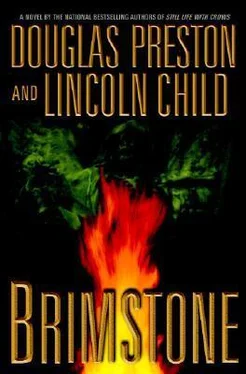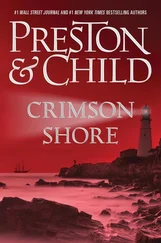Douglas Preston - Brimstone
Здесь есть возможность читать онлайн «Douglas Preston - Brimstone» весь текст электронной книги совершенно бесплатно (целиком полную версию без сокращений). В некоторых случаях можно слушать аудио, скачать через торрент в формате fb2 и присутствует краткое содержание. Жанр: Триллер, на английском языке. Описание произведения, (предисловие) а так же отзывы посетителей доступны на портале библиотеки ЛибКат.
- Название:Brimstone
- Автор:
- Жанр:
- Год:неизвестен
- ISBN:нет данных
- Рейтинг книги:5 / 5. Голосов: 1
-
Избранное:Добавить в избранное
- Отзывы:
-
Ваша оценка:
- 100
- 1
- 2
- 3
- 4
- 5
Brimstone: краткое содержание, описание и аннотация
Предлагаем к чтению аннотацию, описание, краткое содержание или предисловие (зависит от того, что написал сам автор книги «Brimstone»). Если вы не нашли необходимую информацию о книге — напишите в комментариях, мы постараемся отыскать её.
Brimstone — читать онлайн бесплатно полную книгу (весь текст) целиком
Ниже представлен текст книги, разбитый по страницам. Система сохранения места последней прочитанной страницы, позволяет с удобством читать онлайн бесплатно книгу «Brimstone», без необходимости каждый раз заново искать на чём Вы остановились. Поставьте закладку, и сможете в любой момент перейти на страницу, на которой закончили чтение.
Интервал:
Закладка:
But then, he reminded himself, he was not alone. He had Pendergast for company-or, at least, his corpse.
Fosco had faced many adversaries in the past, but none had shown the brilliance or tenacity of Pendergast. In fact, had it not been for Fosco's home soil advantages-his moles in the police and elsewhere, the maturity of his long-laid plans, the scope of his contingency arrangements-the story might well have ended differently. Even so, he'd felt just the least bit anxious. And so Fosco had made sure this evening's constitutional took him back down-very deep down indeed-to Pendergast's current domicile. Just to make sure. As expected, he'd found the newly mortared but carefully disguised wall as he left it. He'd rapped on it, listened, called softly, but, of course, there was no answering response. Almost thirty-six hours had passed. No doubt the good agent was already dead.
He sipped the port, sank back in the chair, basking in the reflections of a successful outcome. There was, of course, one loose end: Sergeant D'Agosta. Fosco reflected on the fury, the impotent murderous rage, on the policeman's face as he'd been led off the grounds. Fosco knew this rage would soon fade. And in its place would come first resignation, then uncertainty, and then-ultimately-fear. Because by now D'Agosta surely must know the kind of man he was dealing with. He, Fosco, would not forget. He would snip off that loose end, finish the business, make D'Agosta repay the debt he incurred for shooting Pinchetti, and in so doing retrieve his clever little invention.
But there was no hurry. No hurry at all.
As he sipped his port, Fosco realized there was, in fact, a second loose end. Viola, Lady Maskelene. He thought of her, tending her bit of vineyard, strong limbs made tawny by the Mediterranean sun. Her bearing, her movements, had a mix of good breeding, catlike athleticism, and sexuality he found deliciously intoxicating. Her conversation sparkled like no other woman's he had met. She was bursting with vitality. She would bring warmth to any place she visited-even Castel Fosco .
A faint sound, like the scurry of dead leaves on stone, came from the darkness beyond the room.
Fosco paused in mid-sip.
Slowly, he put the glass down, stood, and walked to the main entrance to the salotto . Beyond lay the long gallery, lit only by the moon and the occasional wall sconce. Long ranks of suited armor lined the walls, glowing faintly in the pallid light.
Nothing.
Fosco turned thoughtfully. The old castle was full of rats; it was high time he had the head gardener in again to deal with them.
He began walking back toward the fire, feeling a chill that could not entirely be explained by the cool air.
Then he stopped again. There was one thing, he knew, that would put him in fine high spirits.
Taking a tack away from the fire, he made for the small doorway that led into his private workshop. He crossed the dark room, threading his way through a maze of lab tables and freestanding equipment, until he reached the wooden paneling of the rear wall. He knelt, ran one fat hand along the polished wainscoting, found a tiny detent. He pressed it. One of the wooden panels above his head popped ajar with a faint snick. Rising, the count pulled the panel wide, exposing a large safe retrofitted into the stonework of the wall. He punched a code into the safe's keypad, and its door sprung open. Carefully, reverently, the count reached inside and pulled out the small, coffin-shaped wooden case that held the Stormcloud Stradivarius.
He carried the case into the dining salotto and placed it on the table against the wall, well away from the heat of the fire, leaving it closed, so it would slowly accustom itself to the change in temperature. Then he returned to his seat. Compared to the chill of the lab, it was deliciously warm before the fire. He took another sip of port, thinking about what he would play. A Bach chaconne? A flashy Paganini? No: something simple, something clean, refreshing . Vivaldi. "La Primavera," from Le Quattro Stagioni.
After a few minutes, he rose again, walked over to the violin, undid the brass fastening, and lifted the lid. He did not play it, not yet: it would need at least another ten minutes to adjust to the ambient temperature and humidity. He merely gazed dotingly on its wondrous and mysterious finish, its sensual lines. Staring at the violin, Fosco felt a joy, a sense of completion, flood through him.
He returned to his comfortable chair, loosened his cravat, undid his waistcoat. The Stormcloud was back where it belonged: in the family seat. He had snatched it from the jaws of oblivion. It had been worth the expense, the extravagant planning, the danger, the lives. It was worth any cost, any struggle. As Fosco stared at it, glowing crimson in the warm reflected firelight, it seemed to him that the instrument was not of this world. Rather, it was the voice-the song-of the better world to come.
It was now very warm in the room. He rose, took up a poker, pushed the logs back a little, turned his chair from the fire. "La Primavera." The sweet, lively melody coursed through his mind as if he was already playing it. Five more minutes. He removed his cravat and unbuttoned the top button of his shirt.
A log cracked loudly in the fireplace, startling him; he sat bolt upright, the port sloshing out of his glass and spilling onto his open waistcoat.
He sat back slowly, wondering at the sense of unease. Nerves: the affair had taken more of a toll on him than he'd thought. His stomach gave a small lurch, and he set down the glass of port. Perhaps he should have taken something stronger as a digestivo : a drop of Calvados, a grappa, or, even better, one of the excellent herbal digestives produced by the monks at Monte Senario.
A most unpleasant sensation of poor digestion now infused his stomach. He rose, lumbered over to the sideboard-how uncharacteristically heavy he felt on his feet!-and took out a small bottle of Amaro Bor-ghini, filled a small glass with the reddish-brown liquid, and returned to the chair. His stomach was protesting vociferously, and he took a swallow, then a second, of the bitter liqueur. And as he did, he heard another sound, like a footfall, at the door.
He half rose, but felt weak and sank back. Naturally, there was nobody there. There couldn't be. The servants had all been given a few days off. It was his imagination playing tricks with him. It was the strain of the last few days. He was getting on in years for business such as this.
His innards were almost boiling with indigestion and he drained the glass, shifting in his chair, trying to get comfortable. The heat in the room had grown oppressive, but, blast it, there was no one to douse the fire. He fetched a deep, shuddering sigh. He would calm himself, then take out the Stormcloud and restore his previous mood with a leaping rendition of "La Primavera."
Only calmness did not come. He felt a strange oppression creep stealthily over him-a pressure that seemed to build slowly, layer on layer, from within. This was not indigestion; he was getting ill. He mopped his brow with a handkerchief, aware that his heart was beating uncomfortably fast. He had caught a chill in the crypts, no doubt, hefting those heavy bricks, brought out by his unwise second visit to those clammy, nitred depths. He would take a holiday; leave tomorrow, in fact. The isle of Capraia, he told himself, would be a perfect spot .
He extended a trembling hand toward the glass of amaro , but the liqueur suddenly tasted wrong, like hot pitch and vinegar in his mouth-hot, even, in his hand. Burning hot. He rose with a cry, the glass falling away and dashing to pieces against the floor. Fosco whirled, stumbled, righted himself.
Porca miseria, what was happening?
He gasped, felt his eyes smart, felt his mouth go dry, his heart accelerate. For a moment, he wondered if he was having a fit of some kind, or perhaps a heart attack. He'd heard heart attacks often began with a feeling just like this: a feeling that something, something, was terribly wrong. But there was no localized pain to his chest or arm. Instead, the terrible oppression within grew, and still grew, until it enveloped him. His very guts seemed to writhe. He looked around frantically, but there was nothing-not the bottle of port, not the violin, not the furniture or the rich tapestries-nothing to give any aid or explanation
Читать дальшеИнтервал:
Закладка:
Похожие книги на «Brimstone»
Представляем Вашему вниманию похожие книги на «Brimstone» списком для выбора. Мы отобрали схожую по названию и смыслу литературу в надежде предоставить читателям больше вариантов отыскать новые, интересные, ещё непрочитанные произведения.
Обсуждение, отзывы о книге «Brimstone» и просто собственные мнения читателей. Оставьте ваши комментарии, напишите, что Вы думаете о произведении, его смысле или главных героях. Укажите что конкретно понравилось, а что нет, и почему Вы так считаете.












